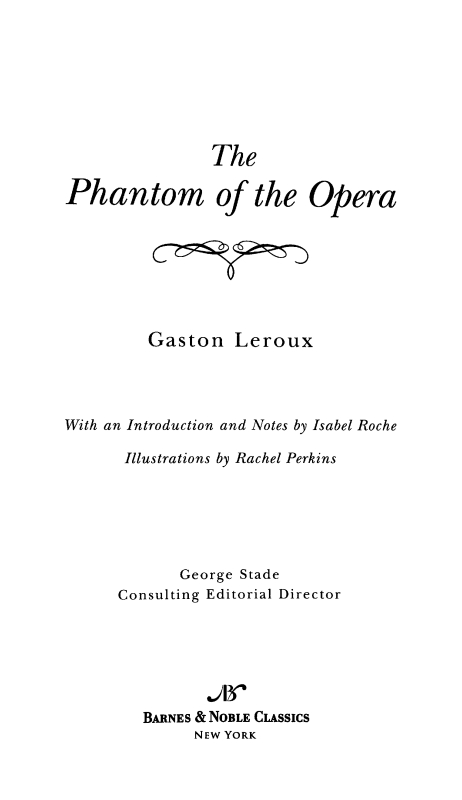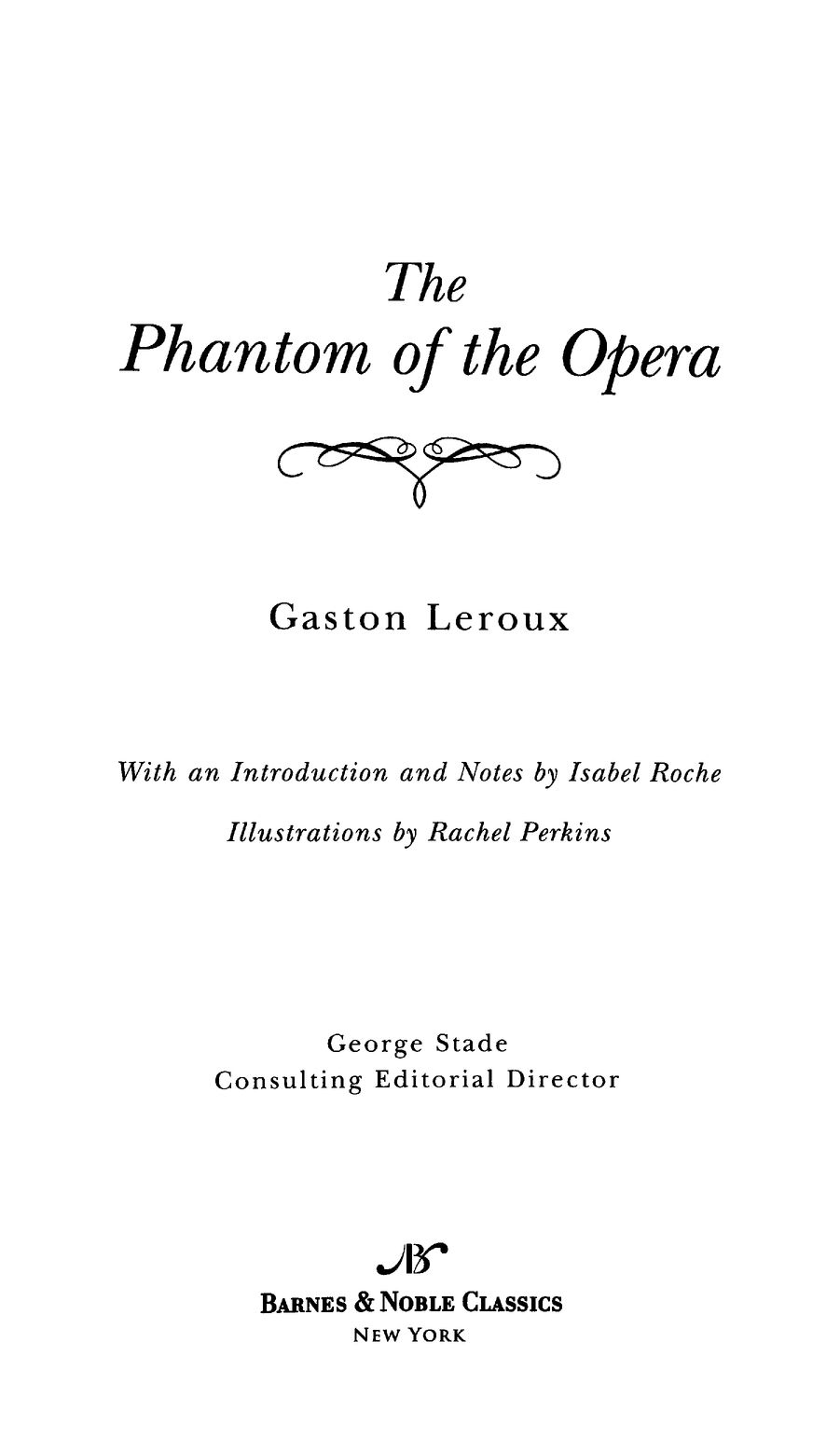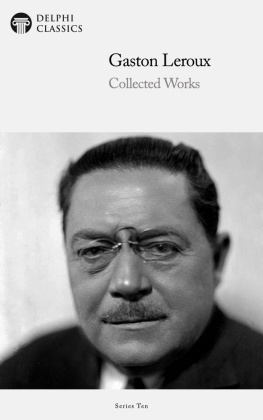
Table of Contents
From the Pages of
The Phantom of the Opera
The Opera ghost really existed. He was not, as was long believed, a creature of the imagination of the artists, the superstition of the managers, or a product of the absurd and impressionable brains of the young ladies of the ballet, their mothers, the box-keepers, the cloak-room attendants or the concierge. Yes, he existed in flesh and blood, although he assumed the complete appearance of a real phantom; that is to say, of a spectral shade.
(page 5)
Daa revealed a new Margarita that night, a Margarita of a splendour, a radiance hitherto unsuspected. The whole house went mad, rising to its feet, shouting, cheering, clapping, while Christine sobbed and fainted in the arms of her fellow-singers and had to be carried to her dressing-room. A few subscribers, however, protested. Why had so great a treasure been kept from them all that time?
(page 21)
Did your father tell you that I love you, Christine, and that I can not live without you?
(page 54)
Moncharmins hair stood on end. Richard wiped the perspiration from his forehead. Yes, the ghost was there, around them, behind them, beside them; they felt his presence without seeing him, they heard his breath, close, close, close to them!
(page 78)
There is a terrible mystery around us, madame, around you, around Christine, a mystery much more to be feared than any number of ghosts or genii!
(page 101)
And he will tell me that he loves me. And he will cry! Oh, those tears, Raoul, those tears in the two black eye-sockets of the deaths head! I can not see those tears flow again!
(page 115)
Blood! ... Blood! ... Here, there, more blood! ... Thats a good thing! A ghost who bleeds is less dangerous!
(page 138)
It was at that moment that the stage was suddenly plunged in darkness. It happened so quickly that the spectators hardly had time to utter a sound of stupefaction, for the gas at once lit up the stage again. But Christine Daa was no longer there!
(page 142)
No, thats impossible. For I dropped you in my cab. The twenty-thousand francs disappeared at your place: theres not a shadow of a doubt about that.
(page 168)
He hit upon astonishing inventions. Of these, the most curious, horrible and dangerous was the so-called torture-chamber. Except in special cases, when the little sultana amused herself by inflicting suffering upon some unoffending citizen, no one was let into it but wretches condemned to death.
(page 211)
We were beginning literally to die of heat, hunger and thirst ... of thirst especially. At last, I saw M. de Chagny raise himself on his elbow and point to a spot on the horizon. He had discovered an oasis!
(page 231)
And what else could Christine say but no? Would she not prefer to espouse death itself rather than that living corpse? She did not know that on her acceptance or refusal depended the awful fate of many members of the human race!
(page 235)
I saved your life! Remember! ... You were sentenced to death! But for me, you would be dead now! ... Erik!
(page 242)
We cried together! I have tasted all the happiness the world can offer!
(page 249)

Gaston Leroux
Before Rupert Julians 1925 film adaptation of The Phantom of the Opera, few knew much about the novel it was based on or the works original author, Gaston Leroux. One of the most popular detective and mystery authors of his time, Leroux was born in Paris in 1868 and attended a boarding school in Normandy, the College dEu, from which he received his baccalaureate in 1886. A talented student, Leroux attended law school in Paris, though he was not to practice law for long. Awarded a law degree in 1889, he was by 1891 working full-time as a journalist, writing arts criticism and reporting on court cases for the paper Lcho de Paris.
Lerouxs skills impressed the editors at the popular daily Le Matin, and they hired him in 1894 as a roving correspondent and investigative reporter. Adventurous, even fearless, Leroux would stop at nothing to get the best take on a story and sometimes donned disguises to pursue promising leads. He relished work on location in Africa, Europe, and Asia, and was a first-hand witness to the Russian Revolution of 1905. His personal life was unconventional; estranged from his wife, he lived for many years with Jeanne Cayatte, a woman he met in 1902 but did not marry until 1917. The couple had two children.
Leroux achieved major success as a fiction writer with the publication of Le Mystre de la chambre jaune (1907; The Mystery of the Yellow Room) and the sequel Le Parfum de la Dame en noir (1908-1909; The Perfume of the Lady in Black), which featured popular character Joseph Rouletabille, an investigative reporter. Beginning in 1909, The Phantom of the Opera was published serially in the newspaper Le Gaulois. Sales were small, reviews were lukewarm, and there was little evidence that the work would outlive its first printings or eclipse the fame of Lerouxs other titles. But in 1925, as the cinema became increasingly popular, Universal Studios adapted Phantom for the silent screen. The film was a success, the first of more than a dozen adaptations of Phantom produced in the twentieth century, including Andrew Lloyd Webbers long-running musical, which premiered on Broadway in 1988 and is still running. The author lived to see the world rediscover his horrifying mystery, although he perhaps could not have foreseen its ultimate longevity. Gaston Leroux died in 1927 in Nice, France.
The World of Gaston Leroux and
The Phantom of the Opera
| 1841 | One of the works that will greatly influence Gaston Lerouxs writingEdgar Allan Poes The Murders in the Rue Morgueis published. |
| 1868 | Gaston Louis Alfred Leroux is born on May 6 in Paris to Dominique-Alfred Leroux and Marie Bidault. |
| 1871 | Lewis Carrolls Through the Looking Glass is published. The Royal Albert Hall opens in London. |
| 1872 | George Eliots Middlemarch is published in book form. |
| 1874 | French novelist and critic Jules-Amde Barbey dAurevilly publishes Les Diaboliques (The Fiends). |
| 1883 | French naturalist writer Guy de Maupassants Une Vie (A Life) and Robert Louis Stevensons Treasure Island are published. |
| 1885 | H. Rider Haggard publishes King Solomons Mines. |
| 1886 | A good student, Leroux receives his baccalaureate degree in Normandy from the College dEu and then studies law in Paris. Stevensons |







